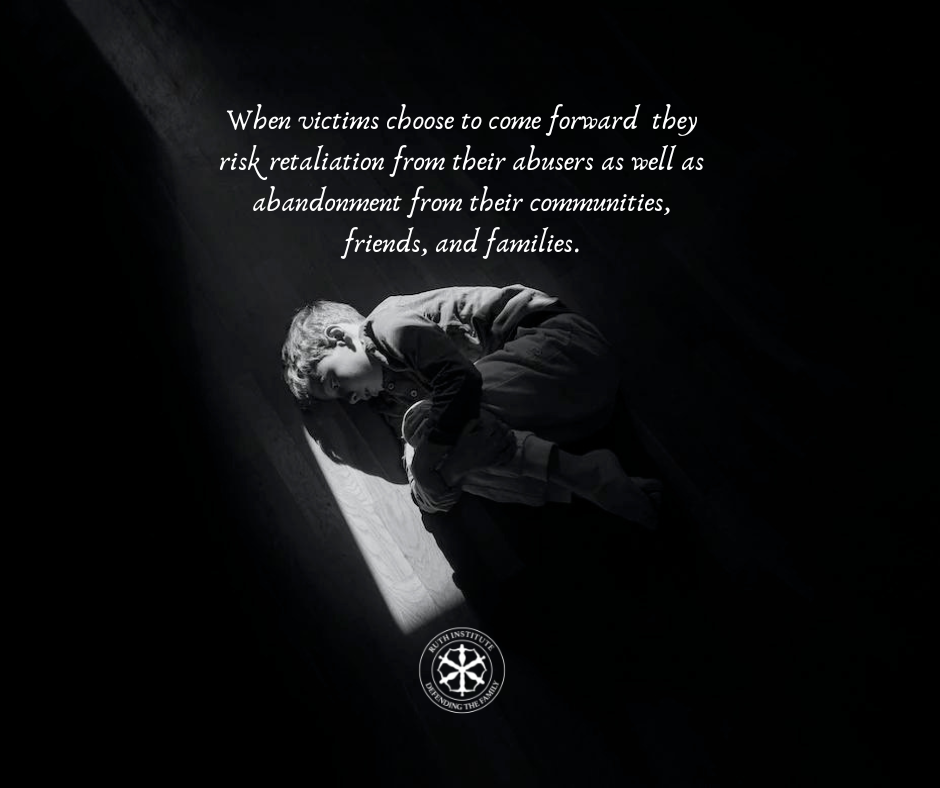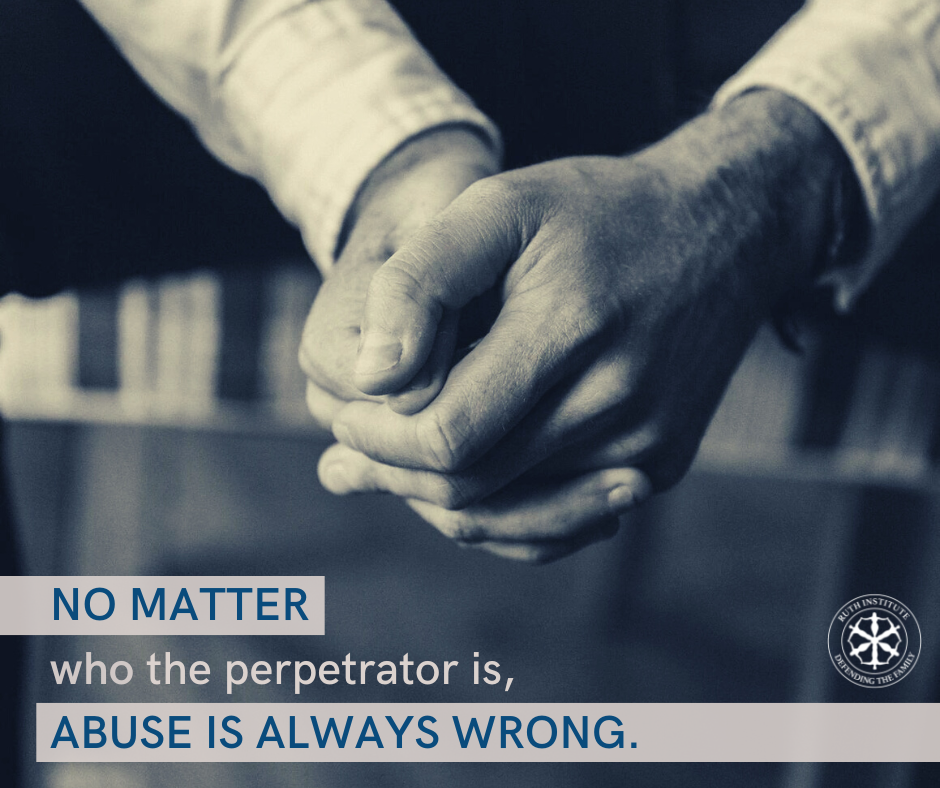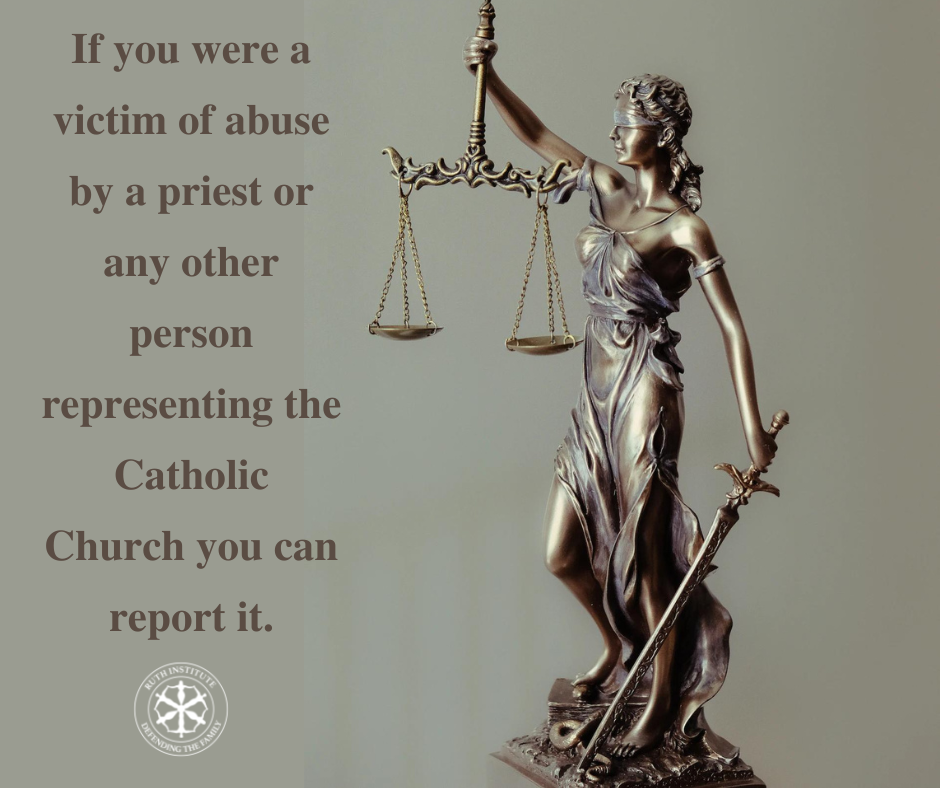If you have been a victim of abuse by a priest or any other person representing the Catholic Church, you can report it. Deciding to report any kind of abuse is not always an easy thing to do especially for a victim. Reporting clerical abuse is no different. Since I have received a few questions specifically about reporting clerical abuse, I’m going to focus on that this week.
Why does it take so long for victims to come forward? Why do some victims not come forward or report clerical abuse at all?
Throughout the clerical abuse scandal, we have heard about victims coming forward years after they were abused.
To learn more about victimization, please refer to this Ask a Survivor article.
Here are some other reasons why survivors of clerical abuse don’t always come forward or report abuse:
- When the perpetrator is a person of influence (such as a priest), a victim is less likely to be believed. It seems a lot easier to believe that a scraggly, creepy looking guy wearing a trench coat is an abuser. But a well-liked, seemingly kind, holy, and intelligent Catholic priest? People have a harder time believing that especially when the perpetrator has groomed the community. I spoke about grooming in this Ask a Survivor article.
- There have been many cases in which a victim has reported clerical abuse, but the perpetrator has been protected. Abusers have often been protected by other members of the clergy. Within the hierarchy of the Church, there seems to exist a “brotherhood” of sorts. “If you cover for me, I’ll cover for you.” Whatever the corruption involved in (it could involve money, abuse, sex, etc.), some priests are covering for one another. Either way, they aren’t willing to turn anyone else in for fear they too will be caught.
- Victims have been made to feel as if they are the problem. Sometimes they are treated as if they asked for the abuse. This sort of treatment makes other victims less likely to come forward. Grooming is such a powerful phenomenon that is still very much misunderstood. A lot of people have a hard time believing that abuse took place if the victim willingly went with their abuser. They also don’t understand why a victim might not have fought back. The reality is that abuse does not always leave victims with obvious physical signs of sexual abuse.
- Not only have people within the ranks of Catholic Church hidden clerical abuse and failed to report it, but oftentimes members of the laity rally around the abuser. This is the result of the predator priest grooming his flock.
- A victim has to come to terms with what happened to him or her in the first place. If a victim is unable to admit to himself that he was abused, then he probably won’t come forward.
- Survivors often live in fear. Not only do they fear not being believed, but they also fear retaliation from their abuser and his/her supporters. When a priestly abuser has groomed the community, then he has typically gained trust and made himself out to be a wonderful person. Personally, I remember thinking to myself, “Why would anyone believe me over him?” My rapist came across as charming, empathetic, holy, and intelligent. He was well-liked by the community. Indeed, when I did come forward, many people within my parish community and in the community at large continued to fall for his cunningness. They supported him. There were even many fellow parishioners I had known and trusted for years who turned against me.

Why should clerical abuse be reported?
- Reporting a church representative for abuse can help prevent him from abusing in the future. When an abuser is stopped, others are protected.
- If one survivor comes forward, it is likely that others will also come forward. There is rarely only one victim especially in cases of clerical abuse. All it takes is just one survivor reporting what happened to him or her to help others face their own pain.
- Victims who report clerical abuse will have an easier time getting the services they need. Services might include assistance finding and paying for a mental health professional, legal services, financial assistance, etc.
- Reporting an abuser (as in the case of a Catholic priest who has sexually abused someone) is helping the Church. It is helping to “clean house” and making our churches safer.

How does someone report clerical abuse?
One might think that the first place to report clerical abuse is to another priest, a bishop, or to the diocese where the abuse took place.
Take it or leave it but, speaking as a survivor of clerical abuse, I have different advice to offer.
If possible, report clerical abuse to local law enforcement first.
Report it to the diocese after you have spoken with law enforcement.
The trouble with reporting clerical abuse to anyone in the Church first is that, as we have seen from the abuse scandal, someone could easily hide evidence or warn the abuser. One would hope that anyone who has been informed about clerical abuse would report it to law enforcement. Unfortunately, in many cases people have failed to do so.
All too often the abusers have been protected more than the victims.
No one in the Church is above the law. Yet, there have been one too many occasions in which people have acted as such. While some punishments can be handed down to a priestly abuser by the Church (such as removing a priest from the priesthood), those punishments alone don’t necessarily protect other potential victims. Abuse is a crime, and the law needs to be involved.
Abuse can also be reported to the United States Conference of Catholic Bishops. The number for the Secretariat for Child and Youth Protection is 202-541-5413.
It’s okay to speak up
I want to make a quick note about an issue I sometimes see on social media. “Never criticize a priest” is a very misleading phrase that I have seen many Catholics use inappropriately. Some Catholics believe that, even when a priest is in error, we should say nothing and simply pray for him. These same individuals have suggested to me that we should willingly suffer, keep quiet, and not “bring shame” to the Catholic Church.
Please do not listen to this advice. It’s awful, it’s sinful, and quite frankly it’s ignorant to include clerical abuse in this sentiment.
While there are times in which criticism about certain petty issues may be unnecessary, this statement should never apply to clerical abuse. It should also never apply to situations concerning grave matters of faith or morals.
Please ignore advice such as this. DO speak up.
No matter who an abuser is, he or she should be held accountable. Abusers should be punished for their crimes. This includes predators who claim to represent the Catholic Church.
Part of loving the Church means loving its people, the children of God. If you ever have to report clerical abuse, don’t let anyone make you feel as though you are creating scandal. Nothing could be further from the truth!
The blame and shame should lie on the abusers and those who covered for them. If the leadership within the Catholic Church is being looked down upon, it is the fault of those who committed these heinous crimes in the first place. Placing blame upon victims and trying to make them or anyone else feel guilty for speaking up is an abomination.
Abusers should be stopped. The cycle of abuse will only continue if they are not. People will continue to get hurt. A predator priest will bring further damage to God’s children with his continued manipulation and deception.
Does reporting abuse to law enforcement mean that an abuser will always be held accountable? Will justice always be served? Unfortunately, no. However, reporting clerical abuse first to law-enforcement certainly increases the chance of that happening. In the future I’ll be talking a little bit more about what to expect from the criminal justice system if you choose to contact law enforcement.

If you are someone who has been a victim of clerical abuse or someone who has witnessed it, I encourage you to report it to your local law enforcement agency.
We need to lovingly encourage people to end their silence by reporting clerical abuse. At the same time, we also need to support those who come forward. W all need to help get the message across that, no matter who the perpetrator is, abuse is wrong, and it will not be tolerated. Reporting a crime such as sexual assault can be the first step in holding a perpetrator accountable for his or her actions. It can also be the first step in seeking justice and helping a survivor begin healing.
There are other agencies that you can report abuse to such as abuse hotlines and local protection agencies. They can help support you and point you in the right direction as you figure out what steps to take next. As numbers and contact information can vary by location, I recommend doing a simple Internet search (“reporting abuse” is a good place to start) to find the information for those.


